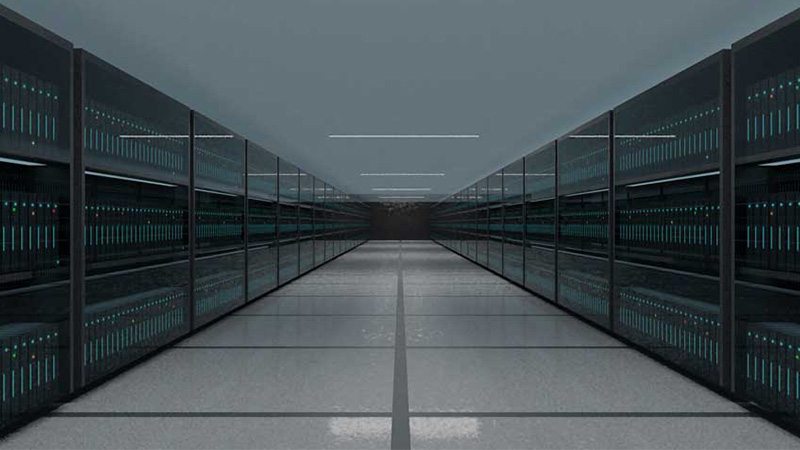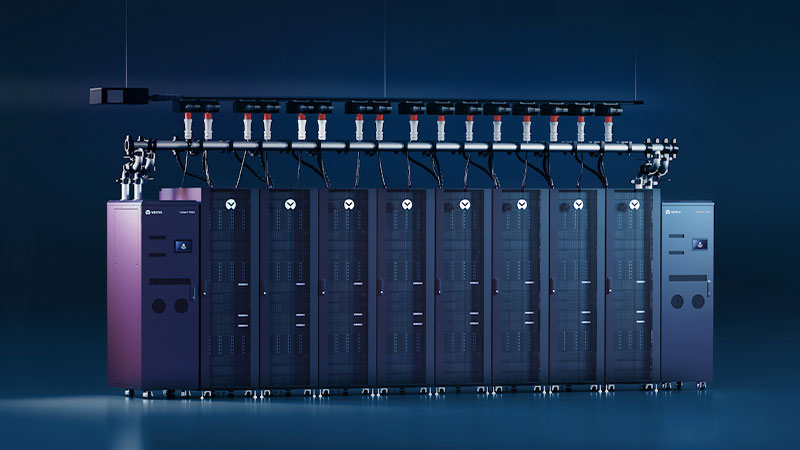International Data Center Day is a time to recognize the contributions of data centers in powering our daily lives -- from the emails we send to the critical infrastructures that sustain cities. With rising power challenges, decarbonization requirements, and artificial intelligence (AI) demands, it's a pivotal moment for a collective effort to find solutions that will shape our future.
Vertiv is at the forefront of addressing these problems. With the rise of AI, data centers are faced with balancing their power requirements with environmental sustainability. In this context, we take a closer look at what lies ahead for the industry by delving into the insights of Vertiv's leaders. Among them are Greg Stover, Global Director of Hi-Tech Development; Peter Panfil, Vice President for Global Power; Steve Madara, Vice President for Thermal Data Centers; and Anand Sanghi, President of the Americas. They participated in a panel discussion during a webinar hosted by Data Center Dynamics (DCD) titled "How to balance AI enablement and sustainability in 2024." And in a separate interview, gain valuable perspectives from Greg Ratcliff, Chief Innovations Officer for Product Development/Engineering.
The Collaborative Imperative
AI has emerged as a formidable driver of transformation, reinventing how industries operate and significantly altering the fabric of our daily lives. And with this technological shift, data centers are bound to evolve in the coming years to avoid disruptions.
Panfil stated in the panel, “The rise in AI compute demand exerts pressure on power consumption and rack densities, and utilities can't keep up.” On top of this, data centers have started to account for their carbon footprint, driving decarbonization and energy efficiency to the forefront of concerns.
As the industry addresses these challenges, it's at an inflection point regarding thermal management. Liquid cooling solutions are increasingly deployed as air-cooling technologies alone can’t efficiently support higher-density workloads. According to Madara, "It will change how we provision data centers. It's good from a sustainability point of view, as it allows us to build smaller and more compact data centers and look at different technologies along the way."
More collaboration is needed now than ever, which Stover emphasized in a panel. "The chip guys, the owner-operators, the design engineers, us as the manufacturers, we're having to talk together very enthusiastically and consistently to solve these problems at the speed that our customers are looking for," he added.
According to Panfil, "our customers are not looking at us as a vendor. They're looking at us as a technology partner." Various deployments to scale and meet AI demands are met with uncertainties in provisioning and normalizing their operations. Sanghi agreed and added: "The [customers] are nervous. The whole ecosystem of how you provision services, what kind of support you need, and what kind of skill sets and capabilities the industry needs to develop to support what will happen here is key. We all have a broader responsibility to make sure that we are also educating and raising the skill sets to deliver."
Securing Our Digital Future
With the demands of the digital space set to escalate, it's crucial for data centers to adapt continuously, leveraging innovative solutions and operational efficiencies to meet the future head-on. Vertiv's experts view these challenges as opportunities to drive the industry toward a more sustainable and resilient future.
Panfil has highlighted the option of bringing your own power (BYOP) due to the utility's inability to meet data center demands, adding that “users are becoming more open to utilizing critical infrastructure even outside of power outages”. As technology advances, the role of the uninterrupted power supply (UPS) can transform into a dynamic energy resource, creating an "always on" environment. Additionally, deploying battery energy storage (BESS) can assist data centers in managing grid instability and lowering carbon emissions by reducing generator starts.
On innovations in dealing with power challenges, Ratcliff pointed to the data centers' capability for grid integration and resource sharing to help change the power profile. "Data centers have largely been purely electricity consumers. However, with recent advancements, future data centers could be a stabilizing element to the local grid. The ability to shift loads, to start fuel cell systems, and to share energy from large BESS will change how data centers move from consumers to partners in stabilizing the future grid."
Stover has affirmed this use of BESS and mentioned that “it could transform data centers into facilities the public would prefer to have in their communities. BESS would make data centers guaranteed power sources for the community during grid instability or power outages”.
Aside from enabling the BYOP strategy, the focus is also on deploying liquid cooling and ensuring it complements existing air-cooling technologies. As Stover had emphasized, BESS and liquid cooling had to go together to meet power and thermal management requirements brought by high-density computing. He adds, "As we transition to liquid, we hit the game for sustainability, heat reuse, higher density, and power computing."
However, as established by the panel, deploying liquid cooling in existing data centers poses challenges, leading to customer uncertainty. As uncertainty drives increased collaboration with critical infrastructure providers like Vertiv, Madara underscores the importance of collaborating on best practices and setting higher standards. He added, "As an industry, we must be cautious of how we go out and do these deployments. We need to standardize and ensure we're providing the most reliable solution out there."
Rethink your critical infrastructure in the age of AI
As we observe International Data Center Day, it's evident that taking proactive steps today will shape the industry's trajectory tomorrow. By prioritizing innovation and sustainability, data centers can pave the way for a more efficient and environmentally conscious future. With increasing AI demands, power consumption challenges, and sustainability goals, the data center industry is at a critical juncture. Implementing practical solutions like liquid cooling and battery energy storage systems (BESS) is key to addressing these issues and preparing for the future.
Explore how Vertiv can optimize your data center for AI readiness. Engineered with industry-leading expertise, our solutions power and cool the most demanding workloads in challenging deployments. Unleash your AI Evolution with Vertiv today.





